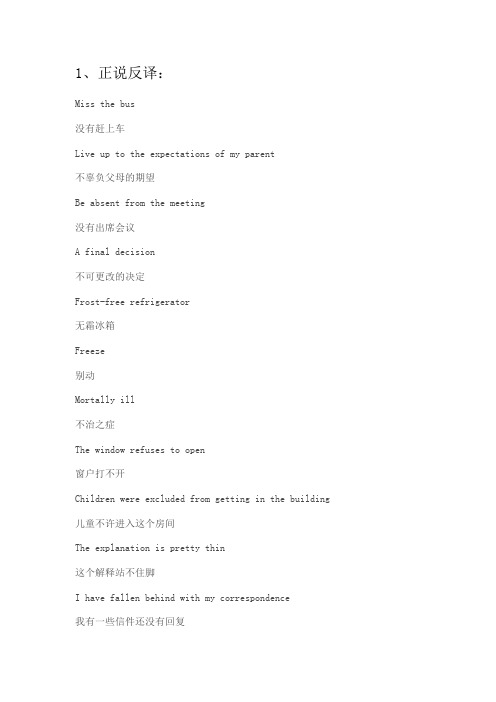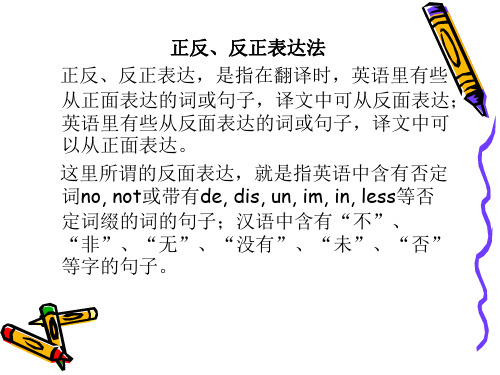正反翻译法
中口词法翻译考点之三正反译法

Free from
没有 / 无 需
Free from anxiety Free from arrogance and rashness. The Southeast Asian countries want to build a zone of peace, freedom and neutrality, free from any form or manner of interference by outside powers.
Anything but
绝不/ 绝不/一点也不
He is anything but clever. Indeed , Chinese officials have gone out of their way to stress that any changes in the exchange rate will be anything but dramatic. 绝不可能出现大幅波动
N. + -free
无 / 免…
Duty-free store Sugar-free food Fat-free milk Freon-free refrigerator A trouble-free life
unless
要是不… 要是不…
You will fail unless you work harder. You can‘t really get along in Western civilization unless you know something about the Bible.
Fail (to do / in sth.)
未能… 未能…
• I failed in my attempt to persuade her. • I fail to see why you won’t even give it a try. • 他仍然没有弄懂 没有弄懂我的意思。 没有弄懂 • failed to understand me.
翻译技巧-正反翻译

4 10
If reading is to accomplish anything more than passing time, it must be active.
如果阅读不仅仅是为了消磨时间,那么阅读必须是积极主动地。
4 10
Transactions of business mail with huge data attachments can be performed without any stress in mobile environments, which may make the word “desk-work” go out of date.
Of course, English-speaking people have their own way of
thinking in the negation and expressing negative implications. What is affirmative in form in English may be implied something negative in Chinese, and vice versa.
4 10
英语反面表达转换为汉语正面表达
• (1) You can't be too careful. 你要特别小心 。 • (2) The significance of these incidents wasn't lost on us. 这些事件引起了我们的重 视。 • (3) Such flights couldn't long escape notice. 这类飞行迟早会被人发觉的。
4 10
6. Keep in lane! 不准换线! 7. Keep off the lawn! 请勿践踏草地!(正说 反译) 8. I couldn’t agree more with you. 我完全同 意你的看法。 9. Just make yourself at home. 不要客气。/ 别见外 。 10. His speech leaves much to be desired. 他的讲话很不如人意。
正说反译

1、正说反译:Miss the bus没有赶上车Live up to the expectations of my parent不辜负父母的期望Be absent from the meeting没有出席会议A final decision不可更改的决定Frost-free refrigerator无霜冰箱Freeze别动Mortally ill不治之症The window refuses to open窗户打不开Children were excluded from getting in the building 儿童不许进入这个房间The explanation is pretty thin这个解释站不住脚I have fallen behind with my correspondence我有一些信件还没有回复Fully clothes, he fell across his bunk and was instantly sleep 衣服也不脱,他往床上横着一倒,不一会儿就睡着了Don’t lose time in posting this letter不要忘了寄这封信No deposit will be refunded unless ticket produced凭票退押金例1:原文:她忍住了没有笑出声。
译文:She refrained from laughing.例2:原文:花园根本无人整理。
译文:The garden was in a state of total neglect.例3:原文:我不能忍受你的脾气。
译文:Your temper is more than I can bear.例4:原文:他宁死不屈。
译文:He would die before yielding.例5:原文:生活远非净是乐事。
译文:Life is far from being a bed of roses.例6:原文:风景美得无以言表。
9 正反翻译法

正反翻译法B练习一(1)If the weather holds a couple of days, the team of the explorers will set off.假如天气三两天里保持不变,探险队就出发。
(2) The Foreign Minister doubted the desirability of a negotiation to be held at this time.外交部长认为此时举行谈判并无必要。
(3) John dived into the water fully clothed and rescued the old lady.约翰没有脱衣服就跳入水中并救出了那个老太太。
(4) The soldiers would rather fight to death before they surrendered.战士们宁愿战斗到死而决不投降。
(5) While trade is good, money is very tight at present.尽管生意不错,但目前资金仍然十分紧张。
(6) The rocket traveling in space is free from the earth’s gravity.在太空飞行的火箭不受地球引力的控制。
(7) In the event of any contingencies beyond our control, we shall not be held responsible for the late delivery of the goods.如果发生我们无法控制的意外事故,我方对迟交货物不负责任。
(8) Cowards die many times before their death; the valiant never taste of death but once.怕死鬼还没死就死了许多次,而勇敢者只死一回。
正反表达英语翻译

16、Those who fear the influence of television deliberately underplay its persuasive power, hoping that they might keep knowledge of its potential to effect social change from being widely disseminated. 那些害怕电视影响力的人故意贬低电视的说服 力,不希望电视影响社会的潜力得以广泛传播。
1、He was an indecisive sort of person and always capricious. 他这个人优柔寡断,而且总是反复无常。 2、Out of sight, out of mind. 眼不见,心不念。 3、My husband missed the last bus, so he had to go home on foot. 我丈夫没有赶上末班公共汽车,所以只好步 行回家。 4、In the high altitude snow and ice remain all year. 高海拔的地方,冰雪终年不化。
正反译法

8. He thought, not very vividly, of his father and mother. 他模模糊糊的想到了他的父母。 9. No one knows where the shoe pinches like the wearer. 哪儿挤脚,穿鞋的人最清楚。 10. Even the logs which burned all day in the fireplace couldn’t keep my little house warm and dry. 火炉里成天烧着木柴,可我的小屋还是又冷有潮。 11. I never hear such a story but I laugh. 我每次听到这样的故事都要笑出来。 12. It is a good horse that never stumbles. 再好的马也会失蹄。 13. One cannot be too careful in driving a car. 开车越小心越好。
1. Don’t lose time in posting this letter. 赶快把这封信寄出去。 2. The examination left no doubt that the patient had died of cancer. 检查结果清楚表明病人死于癌症。 3. Students are to hand in their homework this afternoon with no exception. 学生们今天下午全都得交作业。 4. Such phenomenon can’t long escape 这种现象迟早总会被人发现。 5. The significance of this incident wasn’t lost on us. 这件事的重要性引起了我们的重视。 6. I cannot agree more. 我完全同意。
翻译方法和技巧:正反表达法
• he is too ready to speak. • 他太喜欢讲话。 • I am only too delighted to accept your kind invitation. • 我接到你的盛情邀请太高兴了。 • Teachers are but too glad to sing with students. • 教员非常高兴和学生一起唱歌
• Their views could not possibly be misunderstood. • 他们的意见根本不会被误解。 • Such a state could not possibly have waged war against its neighbor without the backing from other countries. • 这样贫穷的国家没有别国的支持,本来根本 (或无论如何)不会对它的邻国发动战争。 • could not possibly用来加强语气,不能译为 “不可能”。
• 2. negative in English but affirmative in Chinese • Where is the wretched girl? Why do you not come when I call you? • 这死丫头去哪里了?怎么叫你半天才来? • Pierre: hey, what the…! You old fool. • Lena: don’t talk to me that way! I am not your wife. • 皮埃尔:哎,怎么,你这傻女人! • 莉娜:嘴里放干净点!我又不是你老婆 • The music is like nothing on the earth. • 此曲只应天上有 • His speech leaves no room to improvement. • 他的演讲完美之至。
翻译的八大常用技巧
作用与意义1. 重译法:为了明确、为了强调、为了生动2. 增译法:为了更忠实于原文的意思,而又更合乎译文的表达习惯3. 减译法:源语言与目标语言互换的时候增译法就成了减译法4. 词类转移法:语言之间表达习惯的差异迫使译文中词类发生改变,词序有时也随之变化5. 词序调整法:语言之间构成形式并非完全相同,做必不可少的词序改变6. 分译法:主要用于长句的翻译,有时存在于词语语义的分译7. 正反翻译法:由于语言的习惯差异---正话反说,反话正说8. 语态变换法:主要指英汉两种语言间的主动与被动语态的转换In the event of one of the contracting parties being attacked by Japan or any other state allied with it and thus being involved in a state of war, the other contracting party will immediate render military and other assistance with all means at its disposal.一旦缔约国的一方受到日本或者与日本同盟的任何国家之侵袭,因而处于战争状态时,缔约国的另一方即尽全力给与军事及其他援助。
We have to analyze and solve problems.我们要分析问题,解决问题。
A large family has its difficulties.大(家庭)有大(家庭)的难处。
Our old clothes and few sticks of furniture have been pawned or sold.这几件旧衣服和这些旧家具,当的当了,卖的卖了。
Lightly floats and drifts the boat, and gently flows and flaps my gown.舟遥遥以轻扬,风飘飘而吹衣。
正反译法
英语的显性否定表达法
• 形容词 absent, bare, empty, poor, vacant ,free from, far from, last • 副词 副词no, not, neither, nor, nowhere • 介词 beyond, (debate, control, ), out of (breath, control, sight), past repair • 代词 nobody, none, nothing,
• 星期四对我来说不方便,我们星期二碰头好吗?
Thursday is rather awkward for me.Could we meet on Tuesday?
• 我们没有想到他提前三天到达。
His arrival three days in advance is beyond our expectation.
炸弹没有击中目标。 The bomb missed the target.
• 名词:failure, ignorance, absence, lack
由于对历史一无所知,他未能通过面试。 His ignorance in history resulted in his failure in the interview
• 她光着脚走进了房间
She came into the room with no shoes on.
• 这个小孩现在完全能自己走路了。
The child can walk without any help now.
• 她非常勉强地来了。
She came very unwillingly.
• 现在只有出现奇迹才能救活她
• 形容词:free, absent, last, short
正反、反正表达法(翻译技巧)
正反、反正表达法(翻译技巧)Negation在语法与翻译两个不同学科中含义不尽相同。
Negation 作为一种翻译技巧,它主要指在翻译实践中,为了使译文忠实而合乎语言习惯地传达原文的意思,有时必须把原文中的肯定说法变成译文中的否定说法,或把原文中的否定说法变成译文中的肯定说法。
因此,翻译技巧中的Negation译成“正说反译、反说正译法”是比较合适的。
而语法中的Negation则译成“否定”,因为它是指下面四种语言现象:1.Full negative(完全否定);2. Absolute negative(绝对否定);3. Semi negative(部分否定) ;4. Words, or phrases, with negative implication(含否定意义的词或短语)。
前两种否定,除少数情况外,英语汉语中差别不大;而后两者否定,在英汉两种语言的运用中则差别较大,需要特别注意。
从下面的例句中,可以体会“正说反译,反说正译”在翻译中使用的一些情况。
1.I don’t think Tom is correct.我认为汤姆不对。
(不译成:我不认为汤姆是不对的)2.我想小李明天不会来了。
I don’t think Xiao Li will come tomorrow.(不译成:I think Xiao Li won’t come tomorrow.)3. A: Are you not going tomorrow?B. No, I’m not going.甲:你明天不去吗?乙:是的,我不去。
4. ①Africa is not kicking out Western Imperialism ②in order to invite other new masters.①非洲踢出西方帝国主义②并不是为了请进其他新的主子。
(假如不运用“正说反译,反说正译”这一技巧,译文就会成为:“非洲不踢出西方帝国主义为了请进其它新的主子。
- 1、下载文档前请自行甄别文档内容的完整性,平台不提供额外的编辑、内容补充、找答案等附加服务。
- 2、"仅部分预览"的文档,不可在线预览部分如存在完整性等问题,可反馈申请退款(可完整预览的文档不适用该条件!)。
- 3、如文档侵犯您的权益,请联系客服反馈,我们会尽快为您处理(人工客服工作时间:9:00-18:30)。
双否定译肯定
• 1)There can be no sunshine without shadow 译文:有阳光就有阴影。 • 2)When we read, we may visit the most beautiful parts of the earth, without fatigue, inconvenience, expense. 译文:我们阅读时可遍访地球上最美丽的地方,轻松, 便捷,便宜。 • 3)It’s not seldom that he plays Majiang. (= He often plays Majiang. ) 译文:他常常打麻将。
Hale Waihona Puke 形容词• 1)The scientist must approach the familiar just as carefully and cautiously as he does the unfamiliar. 译文:科学家在处理熟知的事物时,必 须像处理陌生的事物一样小心谨慎。 • 2)He was an indecisive sort of person and always capricious. 译文:他这个人优柔寡断,而且总是反 复无常。
• 4)It will not be long before they understand the truth that study hard before it is too late. 译文:他们大概不久就会理解要趁早努力学 习的道理。 • 5)She won’t go away until you promise to help her . 译文:她要等你答应帮助以后才肯走。
名词
1)He was extremely sorry for the shortness of time. 译文:他对时间不足感到十分抱歉。 2)Behave yourself during my absence. 译文:我不在时要规矩点。
介词
1)I do think that it is beyond his power to fulfill the task. 译文:我的确认为要完成这项任务是他力所不及的。 2)His answer is beside the mark.。 译文:他的回答文不对题。 3)I have fallen behind with my correspondence. 译文:我有一些信件没有及时答复。 4)The lecture was interesting,but as far as I am concerned the speaker was speaking over my head. 译文:这讲座很有趣,但对我来说,讲座太深了,听不懂。
固定搭配
• 1)You cannot praise the play too highly. 译文:这出戏你怎么称赞也不过分。 • 2)Young scientists cannot realize too soon that existing scientific knowledge is not nearly so complete,certain and unalterable as many textbooks seem to imply. 译文:现在的科学知识似乎都不像许多教科书所叙述 的那样完善、那样肯定、那样一成不变,对于这种情 况,年轻科学家意识到得越快越好。 • 3)These scientists could not believe the two Curies more. 译文:这些科学家完全相信居里夫妇。
4)The future is not as you think it, it’s dark. 译文:前途不像你想的那样,并不是一片光明。
5)The plan is far from perfect. 译文:这个计划远远不够完善。
副词
• 1)He dived into the water fully clothed and rescued the children. 译文:他衣服没脱就跳入水中,把孩子救了 上来。 • 2)I stayed awake almost the whole night.I'll be here for good this time. 译文:我昨夜几乎一夜没睡。我这次再也走 不动了。 • 3)We may safely say no. • 译文:我们这样说万无一失。
英汉翻译中的正反表达法
• 在英汉互译过程中,由于两种语言表达习惯 不同,往往需要把英语中的正说译成汉语中 的反说,把英语中的反说译成汉语中的正说, 这样才能确切表达原意并符合语言的规范。 这种把正说处理为反说,把反说处理为正说 的译法,叫正反表达法。
定义
什么是正说和反说呢? 英语词句中含有“never”,“no”,“not”, “non-”,“un-”,“im-”,“in-”,“ir-”, “-less”等成分以及汉语词句中含有“不”、 “没”、“无”、“未”、“甭”、“别”、 “休”、“莫”、“非”、“毋”、“勿”等 成分的为反说,不含有这些成分的为正说。
• 33)We will die before we give in. 译文:我们宁死不屈。
祈使句正说反译
• Keep off the grass. 译文:不要践踏草坪。
• Wet paint ! 译文:油漆未干!
二、英译汉反说正译法--动词
1)The doubt was still unsolved after his repeated explanations. 译文:虽经他一再解释,疑团仍然存在。 2)The examination left no doubt that the patient had died of cancer. 译文:调查结果清楚的说明病人死于癌症。 3)I only wish he was here himself,as I don't doubt he will be here at sunset tomorrow. 译文:我希望他也在这里,我有把握,明天太阳下 山的时候,他就要来了。
3)We must never stop taking an optimistic view of life. 译文:我们要永远保持对生活乐观的态度。
形容词
1)The light in the classroom is poor. 译文:教室里的光线不足。 2)The explanation is pretty thin. 译文:这个解释站不住脚。 3)He was absent from his own country last year. 译文:他去年不在自己的国家。
• • • •
Excuse me. He is above himself. We can’t wait to meet you. “对不起” “他自命不凡” “我们要立 刻见到你”
一、英译汉正说反译法--动词
少数特色动词,直译无法再现其隐含语义。 1)“I have read your articles.I expect to meet an old man.” 译文:“我读过你的文章,没想到你这样年轻。” 2)Please remain seated while the plane is taking off. 译文:飞机起飞时请不要离开座位。
介词
• 1)The problem is not beyond our reach. 译文:这个问题我们能解决。 • 2)The whole gun was no longer than eight inches. 译文:整枝枪的长度只有8英寸。
习惯用法
• Violent video games appeared no more likely to cause loss of temper than other forms of play. 译文:含有暴力内容的电子游戏和其 他形式的游戏一样,似乎都不大可能使 人受挫发火。
连词及连词词组
before, since, till, unless, not…until, more than, rather than,…… 1)Before I could say “thank you”,the postman had disappeared around the corner. 译文:我还没来得及说声“谢谢”,邮递员已 经在拐角处不见了。 2)This is more than we could bear. 译文:这是我们所不能忍受的。
习惯用法
• 1) He is anything but a writer. 译文:他决不是一个作家。 • 2)The islanders found themselves far from ready to fight the war. 译文:岛民发现自己远远没有做好作战准备。 • 3)The decision has to come. 译文:决定尚未作出。 • 4)It is a wise father that knows his own child. 译文:无论怎样聪明的父亲也不见得了解自己 的孩子。
祈使句反说正译
• No smoking! 译文:严禁吸烟 • No deposit will be refunded unless ticket produced. 译文:凭票退还押金。 • Don’t lose time in posting this letter. 译文:赶快把这封信寄出去。
否定性动词,其形式是肯定的,但表达的意义是 否定的,如deny,refuse 1)The window refuses to open. 译文:窗户打不开。 2)Such a chance denied me. 译文:我没有得到这个机会。
动词词如keep from,stop from等翻译时 需处理为否定结构,当它们与否定词搭配使 用时则需要译为肯定形式。 1)Children were excluded from getting in the building. 译文:孩子不许进入这幢楼房。 2)Please keep the fire burning while I’m out. 译文:我不在家时请别把炉子灭了。
